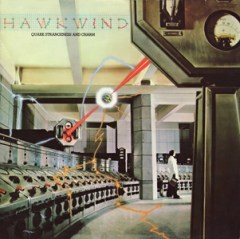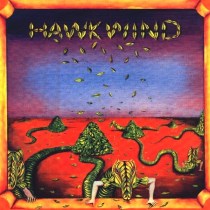 After Warrior on the Edge of Time, Hawkwind shed its psychedelically-scaled skin. Lemmy, the Doom Lord of Bass, was jettisoned; Stacia, the Dream Lady of Dance — shock! — got married; the band changed management and switched record company (to the Charisma label — an appropriate name, considering this era was so much about Robert Calvert’s highly theatrical presence). After their next album, the wonderfully-titled Astounding Sounds, Amazing Music (so wonderfully titled, the band members sometimes have trouble remembering it), Nik Turner was ejected like a roller-skated shooting star honking saxophonic free jazz (he went on to play flute in the Great Pyramids of Egypt), and this beast of a band morphed — or perhaps burst from its previous incarnation’s chest to slide squealing through the blood-spattered remains of the sixties love-feast — into a very different entity. A community-binding collective of tribal shamans no more, Hawkwind became, for the next three studio albums, something like a normal band.
After Warrior on the Edge of Time, Hawkwind shed its psychedelically-scaled skin. Lemmy, the Doom Lord of Bass, was jettisoned; Stacia, the Dream Lady of Dance — shock! — got married; the band changed management and switched record company (to the Charisma label — an appropriate name, considering this era was so much about Robert Calvert’s highly theatrical presence). After their next album, the wonderfully-titled Astounding Sounds, Amazing Music (so wonderfully titled, the band members sometimes have trouble remembering it), Nik Turner was ejected like a roller-skated shooting star honking saxophonic free jazz (he went on to play flute in the Great Pyramids of Egypt), and this beast of a band morphed — or perhaps burst from its previous incarnation’s chest to slide squealing through the blood-spattered remains of the sixties love-feast — into a very different entity. A community-binding collective of tribal shamans no more, Hawkwind became, for the next three studio albums, something like a normal band.
 At its core were the Morecambe & Wise of Space Rock, Dave Brock and Robert Calvert. (They didn’t so much bring you sunshine as send you hurtling towards the heart of the nearest star, Nova Drive blazing.) But it’s Calvert who really defines this era of Hawkwind’s output. He’d been in the band before, as poet and sometimes singer during the Space Ritual tour, but had left to produce some quirky concept albums (consisting of Hawkwind-ish rock, musical pastiches, and mostly unfunny comedy routines). Now he became what Hawkwind hadn’t till this point had — a front man. I mean, you need a manic depressive in charge of your spaceship, don’t you?
At its core were the Morecambe & Wise of Space Rock, Dave Brock and Robert Calvert. (They didn’t so much bring you sunshine as send you hurtling towards the heart of the nearest star, Nova Drive blazing.) But it’s Calvert who really defines this era of Hawkwind’s output. He’d been in the band before, as poet and sometimes singer during the Space Ritual tour, but had left to produce some quirky concept albums (consisting of Hawkwind-ish rock, musical pastiches, and mostly unfunny comedy routines). Now he became what Hawkwind hadn’t till this point had — a front man. I mean, you need a manic depressive in charge of your spaceship, don’t you?
 I can’t speak for Calvert’s attitude towards, or involvement with, the sort of community-oriented feel of Hawkwind’s early years, but his artistic attitude is very much about the individual — the blazing individual, reaching for the heights and gleefully crashing into the wreckage of its own manic drive. Calvert’s lyrics are all about freedom, flight, falling and flame. Icarus gets name-checked in “The Only Ones”, along with the other “daredevil angels” of the sky, but Calvert’s songs are full of people achieving freedom only through a death-risking plummet (“Free Fall”: “You’ve cut the puppet’s strings/In free fall”; or the more coercive need for freedom from the “human zoo” in “High Rise”: “Well somebody said that he jumped/But we know he was pushed”) or the earth-bound alternative in the vehicular crash-and-burn of “Death Trap”‘s “fiery crucifixion”, and “Damnation Alley”‘s “Diving through the burning hoop of doom”. There are more subtle means of gleeful self-destruction bubbling inside the misanthropic, self-consuming “Steppenwolf” (Calvert’s finest moment, for me), the Cold-War Kid (“In a town by the wall the machine gunners wait/To type out the orders that seal his fate”), or the anonymous sky-diver in “Free Fall” (“While destiny is on your case/the gods look up your file”). So much fate, doom and destiny, too.
I can’t speak for Calvert’s attitude towards, or involvement with, the sort of community-oriented feel of Hawkwind’s early years, but his artistic attitude is very much about the individual — the blazing individual, reaching for the heights and gleefully crashing into the wreckage of its own manic drive. Calvert’s lyrics are all about freedom, flight, falling and flame. Icarus gets name-checked in “The Only Ones”, along with the other “daredevil angels” of the sky, but Calvert’s songs are full of people achieving freedom only through a death-risking plummet (“Free Fall”: “You’ve cut the puppet’s strings/In free fall”; or the more coercive need for freedom from the “human zoo” in “High Rise”: “Well somebody said that he jumped/But we know he was pushed”) or the earth-bound alternative in the vehicular crash-and-burn of “Death Trap”‘s “fiery crucifixion”, and “Damnation Alley”‘s “Diving through the burning hoop of doom”. There are more subtle means of gleeful self-destruction bubbling inside the misanthropic, self-consuming “Steppenwolf” (Calvert’s finest moment, for me), the Cold-War Kid (“In a town by the wall the machine gunners wait/To type out the orders that seal his fate”), or the anonymous sky-diver in “Free Fall” (“While destiny is on your case/the gods look up your file”). So much fate, doom and destiny, too.
 Calvert didn’t just sing about these heroes, he became them. In this era, Hawkwind, still trying to create the full experience for its listeners, switched from its earlier attempts at a sort of trance-and-psychosis-led initiation, to something more theatrical, more something to be watched than actively participated in. Calvert dressed up like a WWII pilot or Lawrence of Arabia. He wielded a starter pistol and a sword. (At one point, he tried to attack one of his fellow band members with that sword, on stage. At another, he chased his frightened band-mates through a Paris traffic jam, wearing jodhpurs and a pistol belt; they were so scared they ordered their driver to mount the pavement to escape.)
Calvert didn’t just sing about these heroes, he became them. In this era, Hawkwind, still trying to create the full experience for its listeners, switched from its earlier attempts at a sort of trance-and-psychosis-led initiation, to something more theatrical, more something to be watched than actively participated in. Calvert dressed up like a WWII pilot or Lawrence of Arabia. He wielded a starter pistol and a sword. (At one point, he tried to attack one of his fellow band members with that sword, on stage. At another, he chased his frightened band-mates through a Paris traffic jam, wearing jodhpurs and a pistol belt; they were so scared they ordered their driver to mount the pavement to escape.)
Calvert could do vitriolic satire (in “Uncle Sam’s On Mars”, which takes its form and feel from Gil-Scott Heron’s “Whitey on the Moon”), and silly humour (“Quark, Strangeness and Charm”, with its frankly inaccurate portrayal of Einstein’s love-life), but his most mordant diatribes were reserved for that monotone set of non-individuals who least embodied his ideal — the mediocrities, the button-pushers, the “tiny creeps”, the clones, drones and “insect men”, from the “good morning machine” of “Robot”, to the archetypal “Micro-Man” “who sees the detail but never the plan”.
 Despite this being, to my ears, the most musically successful era of the band’s output, Hawkwind itself seemed to be suffering some sort of psychosis, unsure of its identity (masquerading at times as its split-personalities the Sonic Assassins and the Hawklords), releasing albums in the wrong order (PXR5, recorded after Quark, Strangeness and Charm, was released after the Hawklords album, 25 Years On) before the band made a suicide attempt when, after a US tour, Dave Brock sold his guitar to a fan and decided to give up on Hawkwind altogether. (And Dave Brock giving up on Hawkwind means no Hawkwind.)
Despite this being, to my ears, the most musically successful era of the band’s output, Hawkwind itself seemed to be suffering some sort of psychosis, unsure of its identity (masquerading at times as its split-personalities the Sonic Assassins and the Hawklords), releasing albums in the wrong order (PXR5, recorded after Quark, Strangeness and Charm, was released after the Hawklords album, 25 Years On) before the band made a suicide attempt when, after a US tour, Dave Brock sold his guitar to a fan and decided to give up on Hawkwind altogether. (And Dave Brock giving up on Hawkwind means no Hawkwind.)
Of course, this wasn’t the end. But, for the rest of its life, Hawkwind would continue to switch freely between two identities — the straight-ahead rock band, and the community-binding musical shamans, in an almost polarised division in the next era’s alternations between straight-ahead guitar riffery (thanks to the fabulous Huw Lloyd-Langton) and electronic trippyness.










